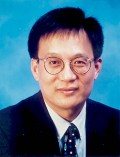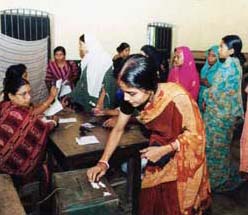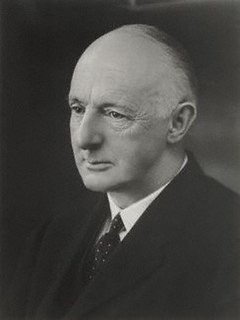
The Democratic Party is a centre-left liberal political party in Hong Kong established in 1994. Chaired by legislator Wu Chi-wai, it is currently the third largest party in the Legislative Council of Hong Kong, having seven seats and 37 District Councillors. It is also the largest pro-democracy party in the legislature.

The 2004 Hong Kong Legislative Council election was held on 12 September 2004 for members of the Legislative Council of Hong Kong (LegCo). The election returned 30 members from directly elected geographical constituencies and 30 members from functional constituencies, of which 11 were unopposed.

Elections in Bangladesh gives information on election and election results in Bangladesh.

Elections in Kenya take place within the framework of a multi-party democracy and a presidential system. The President, Senate and National Assembly are directly elected by voters, with elections organised by the Independent Electoral and Boundaries Commission (IEBC).

Civic Party is a pro-democracy liberal political party in Hong Kong. It was established in 29 March 2006 by a group of barristers. Led by Alvin Yeung and chaired by Alan Leong, the party is the fourth largest party in the Legislative Council of Hong Kong, commanding five seats. It also has 12 seats in the District Councils.

The 2008 Hong Kong Legislative Council election was held on 7 September 2008 for the 4th Legislative Council since the establishment of the Hong Kong Special Administrative Region. There were 60 seats in the 4th Legislative Council, with 30 members elected by geographical constituencies through direct elections, and 30 members by functional constituencies. Candidates for 14 functional constituency seats were unopposed.

The 2010 United States elections were held on Tuesday, November 2, 2010, in the middle of Democratic President Barack Obama's first term. During this midterm election year, all 435 seats in the United States House of Representatives and 37 of the 100 seats in the United States Senate were contested, along with 39 state and territorial governorships, 46 state legislatures, four territorial legislatures and numerous state and local offices. Approximately 82.5 million people voted.

The 2000 Hong Kong Legislative Council election was held on 10 September 2000 for members of the 2nd Legislative Council (LegCo) of the Hong Kong Special Administrative Region (HKSAR). The election returned 24 members from directly elected geographical constituencies, 6 seats from the Election Committee constituency and 30 members from functional constituencies, of which 9 uncontested.

The 1998 Hong Kong Legislative Council election was held on 24 May 1998 for members of the 1st Legislative Council of Hong Kong (LegCo) since the establishment of the Hong Kong Special Administrative Region (HKSAR) in 1997. Replacing the Provisional Legislative Council (PLC) strictly controlled by the Beijing government and boycotted by the pro-democracy camp, the elections returned 20 members from directly elected geographical constituencies, 10 seats from the Election Committee constituency and 30 members from functional constituencies, of which 10 were uncontested.

State elections were held in South Australia on 27 May 1905. All 42 seats in the South Australian House of Assembly were up for election. The incumbent conservative government led by Premier of South Australia Richard Butler in an informal coalition with the liberals was defeated by the United Labor Party (ULP) led by Leader of the Opposition Thomas Price. Each of the 13 districts elected multiple members, with voters casting multiple votes.

The second legislative assembly election to the Madras state was held on 31 March 1957. This was the first election held after the linguistic reorganisation of Madras state in 1954. Indian National Congress and its leader K. Kamaraj won the election, and defeated its rival Dravida Munnetra Kazhagam. In 1954, due to the resignation of C. Rajagopalachari, for his controversial Kula Kalvi Thittam, the leadership of Congress was contested, between K. Kamaraj, and C. Subramaniam. Eventually, K. Kamaraj, won the support of the party, was elected leader and chief minister of Madras State in 1954. In a surprise move, he appointed both M. Bhaktavatsalam and C. Subramaniam, in his cabinet, allowing great unity amongst Congress, that ruled the state of Madras, for the next decade. This election saw future DMK leaders, M. Karunanidhi and K. Anbazhagan winning their first MLA seat in the legislative assembly.

General elections were held in Kenya Colony on 2 April 1924. The elections were the first under a new Constitution which saw suffrage extended to Indians and Arabs, who were allotted five and one elected seat in the Legislative Council respectively, alongside the eleven elected seats for the white population, although appointed members were still the majority. Whilst all adult Indian residents were given the right to vote, in the Arab community only men literate in Arabic or Swahili and resident in the country for two years were enfranchised, as the community had requested that women not be given the right to vote. One member was appointed to represent the majority black population.

General elections were held in Kenya Colony in 1931. Five of the eleven white seats in the Legislative Council were uncontested, with Lord Delamere amongst those returned unopposed. Unlike previous elections, which were boycotted by the Indian population, this time the community participated. Fourteen candidates including two independents contested the five Indian seats. However, seven of them declared that they would not take their seats on the Council if elected until the separate voter rolls for whites and Indians were scrapped.

General elections were held in Kenya Colony in 1934, with the first seats elected on 28 March. Four candidates were returned unopposed in the eleven Europeans constituencies, whilst the remaining seven constituencies were contested by 18 candidates. For the five Indian seats, there were 17 candidates. Voter turnout in the White seats was the highest since elections were introduced. The Council convened for the first time after the election on 24 April.

General elections were held in Kenya Colony between 26 March and 2 April 1938. Three of the eleven white seats in the Legislative Council were uncontested, whilst all Indian seats were contested, and saw more businessmen were elected than politicians. Lady Sidney Farrar became the country's first female Legislative Council member after defeating Conway Harvey in the Nyanza constituency by two votes.

General elections were held in Kenya in 1952.

Legislative Council elections were held in Burma on 21 November 1922, the first in the country's history.

General elections were held for the first time in Nyasaland on 15 March 1956.
The 1927 Victorian state election was held in the Australian state of Victoria on Saturday, 9 April 1927, to elect the 65 members of the state's Legislative Assembly.

The Legislative Council of Kenya (LegCo) was the legislature of Kenya between 1907 and 1963. It was modelled on the Westminster system. It began as a nominated, exclusively European institution and evolved into an electable legislature with universal suffrage. It was succeeded by the National Assembly in 1963.














